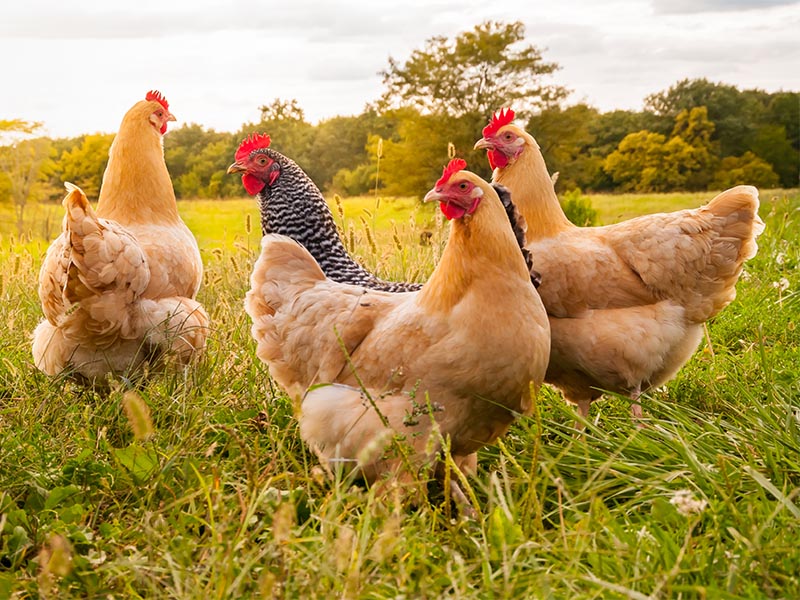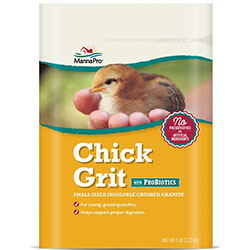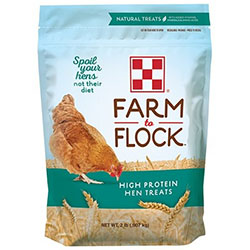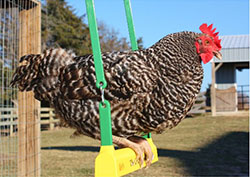
Whether you keep a small coop in your back yard or run a large scale egg operation, keeping your chickens healthy and happy will result in increased egg production and longer life spans. At The Cheshire Horse, many of our customers raise chickens for eggs and meat (they also just love having these special birds being a part of their life as pets!). We spoke with Claire Woods, a popular chicken blogger at The Happy Chicken Coop, who helped us answer some of the most frequently asked questions regarding poultry birds and raising chickens.
What should I do if my chicken eats eggs?
Opening up the nesting boxes and seeing half-eaten eggs is disheartening to chicken keepers. “There are many reasons chickens eat their own eggs. It can be from overcrowding or boredom, but it can also be from tasting it once from that one time you accidentally dropped an egg and it cracked,” Claire explains.
“The best way to solve this is a tried and true method that I have used many times. In the nesting boxes, you can put white golf balls or purchase imitation wood eggs painted white. After pecking and pecking they will tire of the egg not cracking and the situation will usually solve itself. Another important tip is to collect the eggs as soon as your chickens are done laying, this is usually in the afternoon, but monitor and see the average laying time of your flock.”
Make sure that you collect eggs frequently to make it difficult for your hens to eat them. Some chicken keepers and many commercial operations utilize “roll out” nesting boxes which are slanted in such a way that the eggs roll away from the hens and into a safe location after they have been laid.
What is the best way to introduce new chickens into my coop?
Adding new chickens to your flock is an exciting time, but if not done correctly, the results can be lethal. You should always introduce new chickens to your flock with caution. “Chickens have a pecking order and it is not uncommon for them to kill or hurt new chickens,” says Claire. “If they are chicks, the cage method can be used, where you can put your chicks in a cage within your coop or in your chicken run where your older chickens will have to get used to the chicks being present but unable to peck them. After a few days of acquainting you can slowly release your chicks to the flock and supervise. This usually will work. Don’t expect it to go perfectly, the pecking order will take place, but they should sort themselves out quickly.”
When introducing new chickens to the flock, it is recommended that you only try to introduce chickens of similar size or age. This may mean keeping young pullets separated until they are able to defend themselves. Ideally, you will also introduce two or more chickens to the flock at one time so that they will have a “buddy” even if the flock begins to bully them. Finally, try distracting your existing flock with fun food objects and treats scattered through the run, like several heads of lettuce. Just make sure that there is enough that competition does not become an issue.
Many of my chickens pick on one hen, what should I do to protect her?
Sometimes, the pecking order in chickens leads them to pick on a single chicken (often the weakest hen). If this is getting to be too much for the hen to handle, it may be time to separate her and then reintroduce her to the flock. “The most tedious but effective method is to separate her using the cage method as mentioned above,” Claire explains. This allows the chickens to acclimate to her, without being able to injure her in the process. It also lets them reestablish their pecking order.
The eggs from my chickens tend to break easily, why? What should I do?
Fragile eggs are often due to calcium deficiency. In order to strengthen the eggshells, it is recommended that you increase your hens’ calcium intake. Calcium makes harder shells because the shells are calcium-based. Oyster Shell is a popular calcium supplement for poultry birds; it can be mixed with their grain or left in a separate container for self-regulation.
Why do my chickens need grit? How should I give it to them?
Grit is very important for proper digestion in chickens. Because birds do not have teeth to chew their food, they grind food in their gizzards. Grit can be small rocks, crushed granite, or small stone fragments. You can also purchase commercial grit options, such as Manna Pro Chick Grit or Layer Grit Developer. “Chickens need and should swallow grit, the gizzard muscle will grind these together with their food and break it down just like our teeth do,” Claire says. “Always keep a supply of grit on hand for them to freely eat.”
Manna Pro Chick Grit
This chick grit has smaller particles, ideal for young and bantam-sized birds, to help you get the same great benefits of poultry grit but in an easier-to-feed size for young and bantam-sized birds. Helps with proper digestion.
I have a broody hen, but I don’t want to hatch any eggs. What is the best way to ‘break’ a broody hen?
First, it is important to understand what a broody hen is. A broody hen is one whose maternal instincts have kicked in, so she is sitting on a clutch of eggs (regardless of whether they are fertilized or unfertilized) in order to hatch them. Typically, a broody hen will sit on the eggs and only leave them once a day to eat, drink, and defecate. If you want to hatch eggs, having a broody hen is fantastic. However, if you do not want to hatch eggs they can become problematic, by either becoming aggressive of the eggs in their clutch or sitting on eggs for an extended period of time and becoming ill because of it.
“You can break broodiness by removing her from her nest and placing her outside the coop, isolating her from the coop,” Claire explains. “Do this several times a day and it will usually break the broody cycle. You can also close down the nest area making it inaccessible.”
What are some common predators for farmyard chickens? How can I protect my flock?
“Depending on what zone you’re located in, the most dangerous threats to your chickens are likely raccoons, opossums, foxes, snakes, and hawks,” says Claire. “The best protection is a well-sealed chicken coop with no access inside at night.” Most predators hunt at night and if the chicken coop is closed, they most usually will be safe and sound. Hawks tend to hunt smaller chicks, so if possible chicks should be kept in a netted run during the day until they are larger.
What is molting? How can I support my hens through the molting process?
Chicken molting is a natural process, when new feathers are coming in and old ones are falling out. You will observe bald patches on your chickens and a disheveled appearance. It normally occurs once a year, when the days begin to get shorter. Egg production typically decreases during the molt, because chickens are trying to maintain their nutritional reserves.
Be sure that you increase their protein intake with a feed like Nutrena NatureWise Feather Fixer Poultry Feed or treats (for instance Purina Farm to Flock High Protein Hen Treats) during the molting process, You can also provide them mineral additives, such as Durvet Poultry Power, to make sure that they are meeting their nutritional requirements. “Give them some time to get through the molting process,” says Claire. “It is a natural process and they will recover.”
Purina Farm to Flock High Protein Hen Treats
These treats offer essential nutrients your birds need. Your girls will get a well-balanced mix of grains, vitamins and minerals in every delightful bite. This high-protein option helps give a nutritional boost, especially during molt when birds need additional protein.
I have two roosters who are very aggressive, especially toward me and my family! How should I handle them?
“Why do you have two roosters? Are you certain you need two roosters? First, be sure they are not in constant competition and territorial because you have too many roosters compared to hens,” explains Claire. “Secondly, remember it is natural for them to be territorial and protect their flock, but you must let them know you are at the top of the pecking order.” There are many ways to display your dominance but the most popular method is to pick up the rooster, even if aggressive, by using a towel, and walk around with him for a few minutes. Try not to chase after the rooster, as this may cause him to think that you are challenging him which will result in increased aggression.
I think that my chicken has mites, what should I do?
It is important to act fast if you suspect mites, since severe mite infestations can cause intense skin irritation, anemia, and even death. Mites are also highly contagious and tend to infest a flock quickly. These external parasites can often be observed with the naked eye. “To confirm that your chickens have mites, look at their pin feathers and spread their feathers in all different regions and look for mites,” says Claire. Other signs of mites include darkened feathers (from mite droppings), scabbing near the vent, increased preening, and matted feathers.
“If you observe mites, give your chickens a dust bath with diatomaceous earth,” she continues (make sure you wear gloves and face mask while performing this task). There are also a number of non-toxic sprays on the market, such as Durvet Pure Planet Poultry Spray, which will help to eliminate the mite population in your flock. After treating your chickens, it is essential to deep clean your chicken coop, feeders, waterers, and remove and replace all bedding.
Ensuring that your chickens have access to a dust bath on a daily basis can help to prevent infestations from occurring. It can be as simple as a dedicated section of loose dirt in the run or as complex as a constructed dusting box that is filled with diatomaceous earth. The act of dusting coats the feathers and skin, while absorbing extra oils. Then, when the chicken shakes, any potential parasites fly off with the excess dust.
I have heard a lot about free-range chickens, what are the benefits? What are the disadvantages?
“Free-range chickens will produce for you the most nutritious and natural eggs,” Claire explains. “It is a more naturalistic approach to raising chickens and always encouraged.” The benefits of free-ranging your chickens includes mental stimulation and insect control (especially ticks). It also allows you to purchase less feed in many instances because the chickens are continuously grazing throughout the day.
However, there are also some risks to free-ranging your chickens. One of the biggest risks is that predators, such as hawks, foxes, and even domesticated dogs, will be easily able to access your chickens. Even if you are supervising your free range flock, predators can act quickly and you still may not be able to protect them if they are not in a sturdy run.
Your flock may also wander off of your property occasionally, so make sure that your neighbors are supportive (gifts of fresh eggs are often helpful to establish healthy chicken relationships!). It is also important to note that chickens will scratch and destroy lawns, gardens, landscaping, and anything else they can scratch in. Be warned, grazing areas should be just that, made for grazing.
Do I need to deworm my chickens?
“Simply put, no. The key to keeping your chickens safe is to make sure their coops, waterers, and feeders are clean,” Claire explains. Proper biosecurity measures are essential to the health of your chickens. “Do not feed your chickens off the ground. General housekeeping and proper hygiene will keep your chickens safe.”
If you suspect that your flock has an internal parasite infestation, there are a number of commercial deworming products on the market. We recommend that you work with your poultry veterinarian to determine the proper course of action and medication for your birds.
I think that my chickens are bored, what are some ways to keep them entertained?
Just like us, chickens need mental stimulation, especially during the cold winter months when foraging is not an option. “Giving chickens a pile of straw and other organic materials to scratch and peck through will keep them busy for some time. If they have confined spaces, hanging plastic toys from rope works well. Many people will hang old CDs from string and the reflective and spinning effect keeps chickens distracted and busy,” says Claire. We also carry a number of commercial chicken entertainment options, including the Fowl Play Chicken Swing and the Lixit Chicken Toy.
Fowl Play Chicken Swing
This fun item reduces coop boredom and brings smiles to the people that care for them.
Is it safe to eat fertilized eggs?
It is completely safe to eat fertilized eggs, in fact, many cultures prefer fertilized eggs over unfertilized eggs in their cuisine.
At The Cheshire Horse, we love helping our customers learn more about chickens and how to properly care for their flocks! Do you have any questions regarding chicken keeping? Add it in the comments below or contact us to speak to a member of our friendly and highly trained sales staff. We are proud to carry a full line of poultry raising supplies, including chicken feed and treats, chicken coops, and poultry health care products. Our blog also includes a plethora of poultry raising resources, including: Essentials for Raising Chicks, Poults, and Keets; All Cooped Up: Caring for Your Chickens in Winter Weather; and Raising Backyard Chickens.




Learnt a lot from this and passed my assignment with a straight A.
Thank you it was really helpful and interesting.